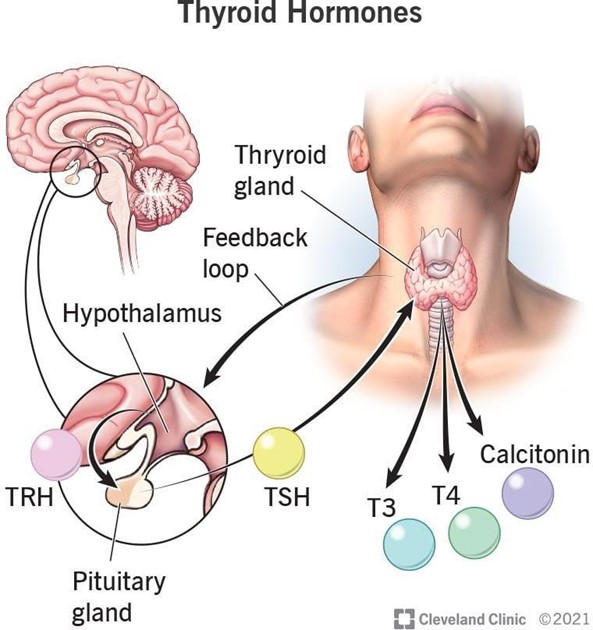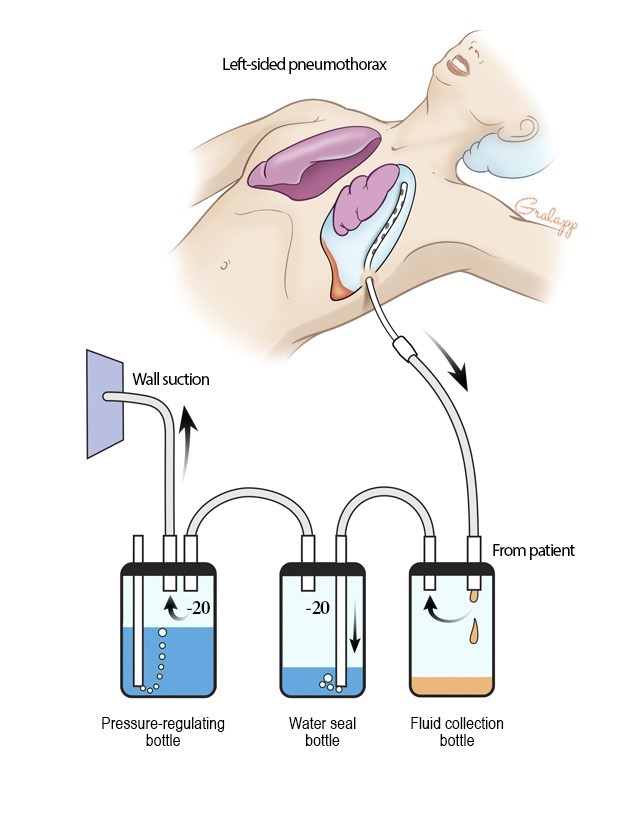A nurse is caring for a client who has a prescription for levothyroxine.
Which of the following laboratory tests should the nurse monitor?
Serum potassium
Triiodothyronine
Blood urea nitrogen
Prothrombin time
The Correct Answer is B
Explanation B.Triiodothyronine
Levothyroxine is a synthetic form of the thyroid hormone thyroxine (T4). It is converted to triiodothyronine (T3), the active form of the thyroid hormone, in the body. Monitoring the levels of triiodothyronine (T3) can help assess the effectiveness of levothyroxine therapy and ensure that the client's thyroid hormone levels are within the desired therapeutic range.
Serum potassium levels in (option A) should not be monitored because they are not directly affected by levothyroxine. However, imbalances in electrolytes can occur in some individuals with thyroid disorders. Electrolyte levels may be monitored, but it is not the primary focus of monitoring for levothyroxine therapy.
Blood urea nitrogen (BUN) in (option C) should not be monitored because it is a test used to assess kidney function and is not directly related to monitoring levothyroxine therapy.
Prothrombin time (PT) in (option D) should not be monitored because it is a test used to evaluate the clotting function of the blood and is not specifically related to monitoring levothyroxine therapy.

Nursing Test Bank
Naxlex Comprehensive Predictor Exams
Related Questions
Correct Answer is A
Explanation
Ensuring the device is kept below the level of the client's chest is important to ensure that the drainage system functions properly by allowing the fluid and air to flow downhill. Placing the device below the level of the chest helps facilitate gravity drainage.

Continuous suction is required for proper functioning of the chest tube drainage system. Clamping the chest tube can disrupt the suction and impede the removal of air or fluid from the pleural space. Only in specific circumstances, such as when changing the drainage system or assessing for air leaks, may the healthcare provider request a temporary clamping of the chest tube.
Positioning the client semi-Fowler's, with the head of the bed elevated, can help promote lung expansion and improve oxygenation. The specific positioning may vary depending on the client's condition and the healthcare provider's recommendations.
The nurse should empty the collection chamber as per the facility's protocol, which typically includes monitoring the drainage and emptying it when it reaches a certain level. Regular emptying of the collection chamber helps maintain proper functioning of the chest tube system and allows for accurate measurement of drainage output.
Correct Answer is C
Explanation
"My baby will receive the rotavirus immunization orally." - This statement is correct. The rotavirus vaccine is administered orally, typically as drops or as an oral suspension. It is important for the guardian to follow the specific instructions provided by the healthcare provider for the administration of the rotavirus vaccine.
"I should not feed my baby anything for 2 hours prior to an immunization." - This statement is incorrect. It is not necessary to withhold feeding prior to immunizations. In fact, it is generally recommended to feed the baby before the immunization to help provide comfort during the procedure.
"My baby will receive three doses of the meningococcal immunization before kindergarten." This statement is incorrect. The number of doses and the schedule for each immunization may vary. The guardian should consult with the healthcare provider or refer to the immunization schedule for the specific recommendations regarding the meningococcal immunization.
"I should expect my baby to have a high fever for 24 hours after an immunization." - This statement is not entirely accurate. While it is common for infants to experience mild side effects such as a low-grade fever after immunizations, a high fever is less common. The guardian should be aware of the potential side effects and contact the healthcare provider if they have concerns about their baby's reaction to the immunization.
Whether you are a student looking to ace your exams or a practicing nurse seeking to enhance your expertise , our nursing education contents will empower you with the confidence and competence to make a difference in the lives of patients and become a respected leader in the healthcare field.
Visit Naxlex, invest in your future and unlock endless possibilities with our unparalleled nursing education contents today
Report Wrong Answer on the Current Question
Do you disagree with the answer? If yes, what is your expected answer? Explain.
Kindly be descriptive with the issue you are facing.
